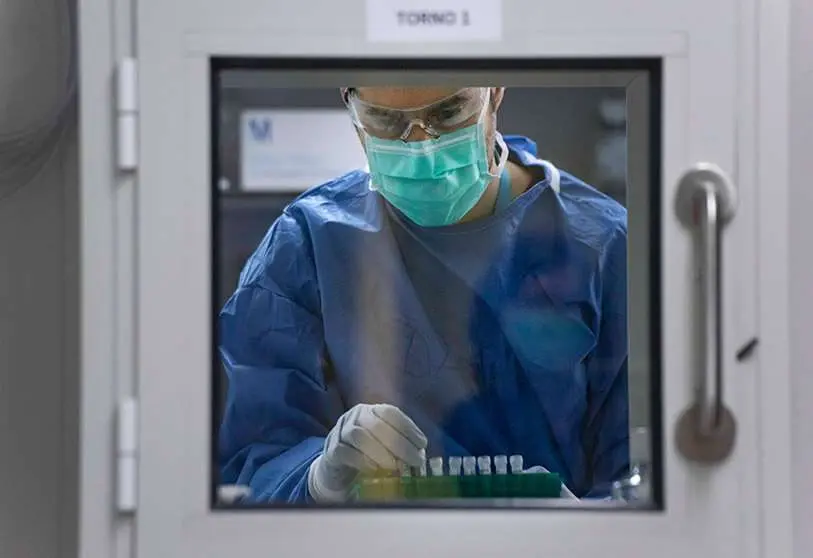The interdependence between human, animal and environmental health: the holistic approach needed to tackle future pandemics

Humans are the animal species most likely to suffer a pandemic like the current one caused by SARS-CoV-2 in the future. Together with domestic animals, which account for 96% of mammals on Earth, the 8 billion people on the planet are the main target for pathogens. In addition, we live hyper-connected in a globalised world increasingly impacted by the climate crisis, where the destruction of natural habitats and scarcity of resources is changing inter-species contacts in the wild.
"All these factors increase the risk of new outbreaks of infectious diseases that could generate epidemics like the one we are currently experiencing", warns Rachel Lowe, associate professor and Royal Society Dorothy Hodgkin Fellow at the London School of Hygiene and Tropical Medicine, who will take part in the conference 'CaixaResearch Pandemics: overcoming COVID-19 and preparing for the future' on 16 and 17 November. Promoted by the "la Caixa "v Foundation and Biocat, the meeting, which will be held in virtual format, will be led by the Barcelona Institute for Global Health (ISGlobal) and the IrsiCaixa AIDS Research Institute.
"If we want to prevent them and be better prepared to face future pandemics, we can no longer think only in terms of human health, as if it were isolated, but we must adopt a holistic approach and begin to consider it in relation to animal and environmental health", adds Lowe, an expert in climate and health who will soon join the Barcelona Supercomputing Center (BSC-CNS) as an Icrea researcher.

Recent past epidemics, such as those caused by the SARS virus, avian influenza or Ebola, already highlighted that the conditions for wildlife pathogens to jump to humans were increasing and that a One Health perspective, i.e. a transdisciplinary "One Health" approach, should be adopted to curb them. However, over the past 20 years, while much effort and resources have been put into initiatives to try to identify emerging pathogens with pandemic potential, which have been unsuccessful, the necessary measures to better prepare for or prevent these new threats have not been implemented.
"There has been a lack of investment in public health, in epidemiological surveillance systems that need to be aligned to trigger alerts, in infrastructure, in education, in communication to combat misinformation, in building the capacity of both low- and high-income countries to contain new outbreaks," says Carolyn Reynolds, head of the Pandemic Action Network initiative.
To take stock of the lessons learned over the last two years and discuss how to prepare to combat future pandemics, researchers from all over the world will take part in the CaixaResearch conference "Pandemics: overcoming COVID-19 and preparing for the future", which already has more than 1,400 registered participants. "More pandemics like COVID-19 will come and we have to be prepared to face them", stresses Julià Blanco, researcher at IrsiCaixa and member of the scientific committee of the event together with Denise Naniche, researcher and scientific director of ISGlobal. "It is crucial that we reflect on what we have learned in this health crisis caused by SARS-CoV-2," he adds.
"The measures we have implemented in recent years to reduce risks were based on an erroneous narrative, focusing on low-income countries and on nature as the focus of potential new outbreaks, when it is high-income countries that are most at risk of developing these new pathogens and spreading them," said Richard Kock, a researcher at the Royal Veterinary College of the University of London, who believes it is crucial that the investment of resources is transferred to strengthen public health services and cooperation between countries in a global health framework.

In this sense, during the first day, the conference sessions will focus on the development in record time of tools for combating COVID-19, which has mobilised an unprecedented amount of resources for research: from vaccines to rapid diagnostic tests and antiviral treatments. A scientific success story that builds on years of research and development, and which has brought about a true revolution in the field of infectious diseases.
The second day, on the other hand, will be devoted to reflecting on what strategies need to be implemented to prevent a repeat of the current pandemic and will focus on the concept of One Health and the need for global equity. Despite the ultra-rapid development of vaccines against COVID-19, their distribution and administration is highly unequal. The situation in high-income countries, with high percentages of the population fully vaccinated, contrasts with the figure of less than 3.5% vaccinated in Africa.
Keynote speakers at the conference include Maria Neira, Director of the Department of Public and Environmental Health at the World Health Organization (WHO); Adolfo Garcia-Sastre, Virologist at the Global Health and Emerging Pathogens Institute of Icahn School of Medicine, Mount Sinai, USA; Daniel Prieto-Alhambra, professor of pharmaco-epidemiology at the University of Oxford; Nathalie Strub-Vergouft, director of the Neglected Tropical Diseases (NTDs) initiative and the Lancet COVID-19 commission. Miguel Luengo-Oroz, scientific director of UN Global Pulse, the UN initiative for the use of big data and AI in sustainable development and humanitarian action applications.
The detailed programme of the conference is available here: https://event.meetmaps.com/caixaresearchconference/en/landing








